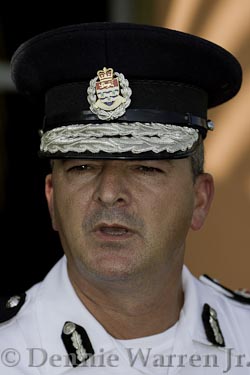Archive for March 28th, 2014

Jeffers denies killing Ming
 (CNS): Raziel Jeffers emphatically denied killing Damion Ming or making any confession to his former girlfriend about the shooting when he took the witness stand on Friday in his own defence. Jeffers was called by his attorney Michael Wolkind QC after the lawyer made a damming opening statement for the defence case ripping apart the crown's key witness whom he described as a 'Ninja agent of revenge'. Jeffers said he was with two friends on the night Ming was killed and the men had visited family members in various parts of West Bay before going to a bar. Jeffers said he had no reason to kill Ming who wasn’t his enemy and he was far from jealous about anything going on with him and the mother of his child, as it was a relief to be rid of her.
(CNS): Raziel Jeffers emphatically denied killing Damion Ming or making any confession to his former girlfriend about the shooting when he took the witness stand on Friday in his own defence. Jeffers was called by his attorney Michael Wolkind QC after the lawyer made a damming opening statement for the defence case ripping apart the crown's key witness whom he described as a 'Ninja agent of revenge'. Jeffers said he was with two friends on the night Ming was killed and the men had visited family members in various parts of West Bay before going to a bar. Jeffers said he had no reason to kill Ming who wasn’t his enemy and he was far from jealous about anything going on with him and the mother of his child, as it was a relief to be rid of her.
Asked by his lawyer as soon as he took the stand if he had killed Damion Ming, Jeffers replied clearly and emphatically, “No Sir”. He denied any gang affiliations and said he had known Ming since back in school when they were friends, and although they had not kept up after leaving school they were friendly and there were no problems between them. Jeffers said one of his daughters was close friends in primary school with Ming’s son and had no desire to see him killed. Discussing Ming’s possible involvement in the Alrick Peddie murder, Jeffers however distanced himself from gang affiliations.
Talking about the mother of his child, the crown’s principle witness against him and his alleged former girlfriend, Jeffers told the jury that he never had a real relationship with the crown’s key witness and from the very start when they began having sex he made it clear he was not interested in anything more.
He related various accounts of fights between them and of her demanding far more from him than he was prepared to give. He said that the communication they did have was as a result of the baby which he believed was his, although he said she had avoided requests for a DNA test. Speaking of a tumultuous affair he said she was aggressive and violent but he was not the same towards her and that he had tried to make her understand that he was not interested.
Jeffers explained that he had become her guardian as a means to help her keep the baby because she was homeless and there was no one to help her. He said this was a temporary measure until she was 18, when he had told her she must make her own way and find somewhere to live.
He said he was never in a relationship with her but she was angry with him because he stopped having sex with her and was seeing other women. He said that he rarely spent time with her in the house she stayed in, which belonged to Jeffers’ father, and that while he mostly stayed away from her and did his own thinghe would give the baby what he needed.
Jeffers described her as becoming an embarrassment and spoke of a number of violent encounters with her, which he said she had instigated. He described her smashing things up at his father’s house when she was vexed and he said he was grateful when she went to stay at an apartment that Ming had paid for and had even helped her move in to. “I was glad someone else was taking the burden of what I had been going through,” he told the court when he was asked if he was jealous before insisting that he was not.
He said she had had relationships with a lot of men and had a bad reputation for being involved with people who were said to be gangsters. He said she bragged about celebrating when Mark Seymour was killed in what was suspected as tit-for-tat gang violence outside Kelly's bar in 2008, and also about being grazed by bullets when she was at one boyfriend's house that was shot-up.
Leading up to the night that Ming was murdered Jeffers said he had been avoiding her, and when he went back to the house where they stayed in George Town they had fought. He recalled how she had stabbed him in the leg with a pen. He said it was because he would not have sex with her or stay home with her. When she came at him with the pen he pushed her onto the bed before leaving with friends and going to West Bay.
Jeffers told the jury that he went to meet his mother and then later to his friend's’ father’s house before he and the two men who he was with went to the West bay Bar – Power Supply – which is where they were when word reached them that there had been a shooting.
He said that he had heard about someone being shot and killed at 177 Birch Tree Hill Road as he received a call from a friend, and that it was a place where he had lived in the past and where he knew many people. Jeffers said he was concerned and explained that the telephone records that show him calling the crown’s witness that night was because he wanted to know if she had heard anything about who had been shot, as it was not until later that he learned it was Damion Ming. He denied calling her to say Ming had been “touched up,” as claimed by the crown’s witness.
The defendant also told the court that he was not at the apartment in Ocean Club during the weekend after Ming’s killing, the place and time where she had told the court that Jeffers had confessed to her about the murder. He said on the night Ming was killed he had gone to another woman’s house in Prospect after he had been out with friends.
Following his evidence in chief, Jeffers faced cross examination from the crown. As a result of his decision to take the stand, the jury heard confirmation that Jeffers is already serving a life sentence having been convicted of murder, attempted murder of four others, and possession of an unlicensed firearm in another case, and other previous convictions for violence. However, he emphatically denied being responsible for those crimes.
Andrew Radcliff QC for the prosecution will continue his cross examination of the defendant on Monday.

Work force agency goes on road to help job seekers
 (CNS): Local unemployed workers looking for a job will be able to go to their district library over the next two weeks to get direct help from government officials and check the database of vacancies registered with the National Workforce Development Agency (NWDA), officials said. How many jobs are open is unclear but the NWDA said it is going out to the community in an effort to, what it described as “provide improved customer service to its clients in their job seeking efforts.” The agency will have a representative at the district libraries on Mondays and Wednesdays.
(CNS): Local unemployed workers looking for a job will be able to go to their district library over the next two weeks to get direct help from government officials and check the database of vacancies registered with the National Workforce Development Agency (NWDA), officials said. How many jobs are open is unclear but the NWDA said it is going out to the community in an effort to, what it described as “provide improved customer service to its clients in their job seeking efforts.” The agency will have a representative at the district libraries on Mondays and Wednesdays.
The government agency said this would provide opportunities for job seekers to register online with the NWDA and to search the online job portal and self-refer for vacancies – in other words make an application. They will also provide assistance with preparing resumes and help with getting ready and getting through an interview successfully.
The officials will be at the East End Library on Monday, 31 March 10:00am -1:00pm and then at the Bodden Town Library on Wednesday, 2 April 2:00pm -5:00pm. The following week they will be at North Side Library on Monday, April 7 10:00am -1:00pm and then West Bay on Wednesday, April 9 10:00am -1:00pm.

$500K debt paid to pensions
 (CNS): The government department responsible for private sector pensions is finally getting to grips with the major delinquency issues surrounding private sector pensions and the massive failure on the part of local employers to follow the law and the even bigger past failure of the authorities to enforce it. According to the director of Labour and Pensions, who has been focusing heavily on this growing and potentially disastrous problem for Cayman, since the start of the year, employers have paid in almost a half million of owed cash including cash directed into funds by the courts. The number of delinquent cases has also been reduced from near 700 in 2011 to 159.
(CNS): The government department responsible for private sector pensions is finally getting to grips with the major delinquency issues surrounding private sector pensions and the massive failure on the part of local employers to follow the law and the even bigger past failure of the authorities to enforce it. According to the director of Labour and Pensions, who has been focusing heavily on this growing and potentially disastrous problem for Cayman, since the start of the year, employers have paid in almost a half million of owed cash including cash directed into funds by the courts. The number of delinquent cases has also been reduced from near 700 in 2011 to 159.
Based on data provided by two of the six multi-employer pensions plans, officials from the national pensions office said that since January 2014 delinquency payments received from employers in arrears beyond those resolved in court have accumulated to the value of CI$468,416.
The National Pensions Board (NPB) also revealed In a progress report released Thursday March 27 (CNS has requested a copy and is awaiting a response) that the long-standing backlog of complaints files and related cases has been cut dramatically. Originally the office was facing a mountain of almost 700 case files but an audit of those complaints through 2012 and 2013 led to a revised count of 378 files. The audit revealed a number of redundant as well as multiple duplicated files on the same business. As of 28 January 2014 another 219 files were resolved or closed.
Of the remaining 159 cases currently open, the officials stated that 84 are under investigation, 52 are identified to be fast tracked, six are on a payment plan, 11 have been resolved but not closed and only six have been found to be statute-barred.
During the twenty month review period the NPO had assigned four permanent Senior Pensions Officers and four temporary officers to tackle the remaining files and the work appears to have paid off.
Officials said the officers prioritised several aging files going back to1998 when the law to mandate pensions was passed. But officers have also been working on the most recent complaints and officials said interim data suggests that since the start of the year 86 new complaints were resolved with an accumulated value of CI$131,326.
Two long-standing cases involving charges for breaches of the law were resolved in Court with payments of arrears by the two employers into the pensions fund account of the employees of those companies, made in the amount of CI$148,000.00.
Director of the Department of Labour Pensions, Mario Ebanks was pleased with the progress.
“The SPO’s [Senior Pensions Officer] defined a robust strategy to review and process the outstanding files, which proved to expedite our work,” he said. “Although it will be some time until we get caught up with all of the backlog cases, including progressing some for prosecution, we now have a more accurate position of where we are with respect to the backlog cases.”
He said the department would continue to work diligently to monitor and manage the ongoing pensions' delinquencies and arrears, resolve new complaints, as well as educate employers and employees on the National Pensions Law and the regulations.
The National Pensions Office, a division of the Department of Labour and Pensions, is located on the 2nd Floor, Mid Town Plaza, Elgin Avenue, George Town, and can be contacted at 945-8960 during regular business hours of Monday to Friday, 9:00 am – 4:00 pm. The office's website is at www.npo.gov.ky. The Department has also established a hotline for confidential information and tips, tel. 345-945-3073.

CoP report to go to DPP
 (CNS): The director of public prosecutions will be the person who makes the final decision on the police commissioner’s use of force during an arrest on New Year’s Day. Although it is still unclear which officer within the ranks of the RCIPS conducted the internal investigation into their boss, the governor’s office confirmed this week that the report is near completion. Once finalised the report will go to Cheryl Richards, QC, who will decide if David Baines was right to use his vehicle to run over a suspected robber fleeing on foot or if he went too far and should be charged. Officials from Governor Helen Kilpatrick’s office also confirmed they now have the report surrounding the circumstance leading up to the death of PC Raphael Williams.
(CNS): The director of public prosecutions will be the person who makes the final decision on the police commissioner’s use of force during an arrest on New Year’s Day. Although it is still unclear which officer within the ranks of the RCIPS conducted the internal investigation into their boss, the governor’s office confirmed this week that the report is near completion. Once finalised the report will go to Cheryl Richards, QC, who will decide if David Baines was right to use his vehicle to run over a suspected robber fleeing on foot or if he went too far and should be charged. Officials from Governor Helen Kilpatrick’s office also confirmed they now have the report surrounding the circumstance leading up to the death of PC Raphael Williams.
Williams (45) took his own life two days after he was released on police bail, having been arrested on allegations of blackmail and breach of trust and suspended from duty. His body was found hanging from a tree in the East End bush and officers from the Bermuda Police Service were invited here to investigate the circumstances leading up to his death and his questioning by the Anti-corruption Unit. Although few details were released regarding the allegations made against Williams, it is understood that he was not trying to extort cash.
The governor’s office stated that while the governor is reviewing that report, it will not be made public for some time as the officer’s suicide will be the subject of a coroner’s hearing and no date has yet been set for what will be a public enquiry.
The report on the commissioner’s apprehension of the three jewel robber suspects on New Year’s Day has taken several weeks and its author remains a mystery.
Despite documentation seen by CNS that indicated that Deputy Commissioner Anthony Ennis was undertaking the investigation, the senior officer denied having anything at all to do with the internal enquiry. It is understood that his involvement went no further than him being the gold command officer at the time Baines ran over a suspect during the high profile arrest of three men he saw fleeing from Diamonds International on New Year’s Day in downtown George Town.
Although Detective Inspector Joseph Wright is in charge of the robbery investigation, CNS understands that he did not conduct the probe into the commissioner’s use of force.
The arrest by the commissioner won him wide commendations from the public, which in the face of rising crime was buoyed by seeing a senior police officer getting his hands dirty on the frontline of the crime fight. In a major coincidence, the incident occurred on the day after the revelation that Baines had received an OBE in the Queen's honours list for his services to policing in the Cayman Islands, despite being here for less than five years and leading the RCIPS at a time when crime was considered to have reached unprecedented levels.
However, one of the men was struck down by the commissioners car and run over. Jonathan Ramoon was pinned under the vehicle and sustained a number of arm and leg injuries. It took some two hours for the police to free him and he remained in a wheel chair during his most recent court appearance.
So far, none of the suspected three robbers have formally answered the charges but they are all facing a minimum of ten years jail time if convicted.

Defence claims Ming was police informant
 (CNS): The possibility that others may have wanted Damion Ming dead was raised in court Thursday, as the lawyer representing Raziel Jeffers, who is charged with his murder, probed the lead officer about Ming’s role as an informant. The question of whether or not Ming gave any evidence to police about two robberies, the suggestion that he could have had something to do with the killing of Alrick Peddie and his criminal and gang involvement were raised by the defence with police witnesses involved in the investigation. However, Malcolm Kay, the Senior Investigating Officer (SIO) on the case, was stationed on Cayman Brac before heading up the murder enquiry and knew little about Ming’s circumstances before he was killed.
(CNS): The possibility that others may have wanted Damion Ming dead was raised in court Thursday, as the lawyer representing Raziel Jeffers, who is charged with his murder, probed the lead officer about Ming’s role as an informant. The question of whether or not Ming gave any evidence to police about two robberies, the suggestion that he could have had something to do with the killing of Alrick Peddie and his criminal and gang involvement were raised by the defence with police witnesses involved in the investigation. However, Malcolm Kay, the Senior Investigating Officer (SIO) on the case, was stationed on Cayman Brac before heading up the murder enquiry and knew little about Ming’s circumstances before he was killed.
Taking the witness stand, Kay said he could not answer questions about Ming’s role as an informant as he had no dealings with him and was not on Grand Cayman for several years before he was brought back to head up the investigation. Michael Wolkind, QC, had questioned Kay about Ming’s background and queried whether or not he had given information to the police about other well-known West Bay gang members being involved in the Cayman National Bank robbery in West Bay and another at Fosters. Kay said he did not know anything about that.
The SIO acknowledged that Ming was well known to the police and accepted that he had a long rap sheet, which included drug trafficking, firearms and accessory to robbery. But the senior officer, who is now with CID in George Town, said at the time he knew little about the victim’s previous history because he had been in the Brac as head of the station there. He returned for just two months to head up the investigation, he explained, as the RCIPS was stretched to the limit at the time. As well as the Ming case, the police were dealing with a number of other killings, which were all believed to be gang related, and Kay said it was “all hands to the pump”.
He was also unable to give Wolkind much information about comments made to officers in the immediate wake of the murder from neighbours near the scene of the crime that may have seen men dressed in black getting into a white car and speeding away. Kay said that house-to-house enquiries were conducted around the area and had anybody seen something like that he believed that the police would have followed up those leads.
One of the 14 officers who had also come to support the RCIPS from the UK took the stand via video link Thursday and spoke about her interviews with the crown’s key witness and the defendant’s former girlfriend.
She stated that the crown’s leading witness had told her on 7 May about the confession Jeffers had allegedly made about Ming’s killing and she told the officer it was the Friday morning, the day after the murder. The UK officer, one of 14 brought over to assist with the various murder enquiries, said she had not made any notes or recorded anywhere that the witness ever said the confession was made to her on the Saturday.
However, during her own evidence to the court this week, Jeffers’ former girlfriend had said she was wrong about the Friday and believed it was the Saturday that Jeffers had made his unexpected confession about killing her friend Ming.
The UK police officer also confirmed that police were aware that Ming had reportedly sent a text message to Peddie, who was known as ‘Bling’, the day before his killing on 24 March, saying that there was only room for one ‘Bling’ on the island. This was the day before Ming was murdered on 25 March.
As the crown has now called what it expected to be its final live witness, the court is now expected to hear the admission statements Friday morning before the case against Jeffers is closed and the defence begins its response.
The case continues in Grand Court before a jury and Justice Malcolm Swift.

Wheelchairs go walkabout
 (CNS): The Cayman Islands Hospital appears to be suffering from a non-medical epidemic, with 30 wheelchairs having disappeared from the premises over the last five years. Health Services Authority CEO Lizzette Yearwood acknowledged the problem and estimated that each year, anywhere from five to eight wheelchairs go missing. On a daily basis, there should usually be about 10 wheelchairs available for use throughout the hospital, but these days that number is down to eight, she said. The most likely reason for the disappearing wheelchairs, which cost between $200 and $300 each, is that people are simply taking them, with no intention of bringing them back, Yearwood explained. (Photo bySandra Catron)
(CNS): The Cayman Islands Hospital appears to be suffering from a non-medical epidemic, with 30 wheelchairs having disappeared from the premises over the last five years. Health Services Authority CEO Lizzette Yearwood acknowledged the problem and estimated that each year, anywhere from five to eight wheelchairs go missing. On a daily basis, there should usually be about 10 wheelchairs available for use throughout the hospital, but these days that number is down to eight, she said. The most likely reason for the disappearing wheelchairs, which cost between $200 and $300 each, is that people are simply taking them, with no intention of bringing them back, Yearwood explained. (Photo bySandra Catron)
“It is suspected that patients are taking them off the hospital compound and not returning them,” she said. At the moment, there are no security measures in place to prevent the chairs being taken, but the administration is now being forced to take precautions.
Larger hospitals, such as those in the US, employ security staff who routinely guard against wheelchairs being taking off premises, but that requires additional personnel.
“We are in the process of securing the wheelchairs, which includes locking them until they are required by a patient,” Yearwood said. “We have also started to place poles on the chairs to prevent them from being placed in vehicles.”
Patients with trucks can still fit the chairs in their vehicles, however, a point made by Cyndy Ebanks, a nurse in the hospital’s Ambulatory Care Unit. She has been dealing with trying to keep the unit’s lone wheelchair safe for years. In 2006, they received a dedicated wheelchair but it has been an ongoing problem holding onto it.
“Once the chair disappeared for about six months,” Ebanks recalled. “One of the hospital’s security staff saw it in someone’s shed in the Eastern Districts and recognised it. He brought it back to the hospital and after that a staff member donated a bicycle chain. We now keep it locked in a room in the unit.”
Suggesting that porters, who are responsible for in-hospital transport, should always remain with the wheelchairs, Ebanks added, “I’d rather push the patient to the entrance myself so I can bring the chair right back to the unit.”
Another staff member gave examples of wheelchairs being found on the roads after whoever was using them simply left them in the street when they were no longer needed.
Estimates from other hospital personnel put the number of wheelchairs now available as low as five, including the ACU chair, with two dedicated to maternity, one donated to the Critical Care Unit and one “roaming’ chair for the other units and wards.
The Accident and Emergency and dialysis units are the most frequent users, along with elderly or immobile inpatients who need to be transported within the hospital, or outpatients who have to be wheeled to and from their cars. For whatever the use, the issue of wheelchairs being removed creates a continuing hardship. “I am appealing to any one who uses the wheelchairs to ensure they are returned safely so they can be available for the next patient who is in need,” Yearwood said.
Ebanks added her own appeal: “Please bring them back because it could be your mother or father who needs a wheelchair and there aren’t many available. If you have any in your home, bring them to the hospital, no questions asked.”
Yearwood said she would welcome any donations of wheelchairs, and thanked previous sponsors who have helped provide chairs over the years.